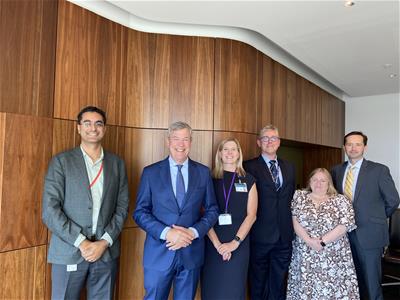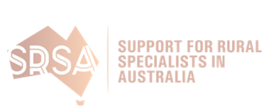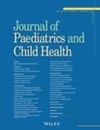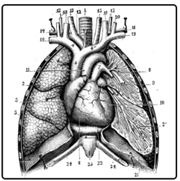Pot-pourri eBulletin - 21 March 2025

It’s hard to believe we are almost through the first quarter of the year. Everyone is so busy, and so I thank you for taking time out to read this update. I’d like to extend a special welcome to the 29 new PCHD Fellows who joined our community last month.
Monday, 24 February saw the College meet with The Honourable Tim Nicholls MP, QLD Minister for Health and Ambulance Services. Aside from myself, those attending from RACP were Professor Brian Wood, AMD President-elect, Dr Dayna Law FRACP, Ms Tracey Handley, SEO RACP QLD, and Mr Samuel Dettman, Senior Policy Officer.

The objectives of the day were to build stronger relationships, to put forward our key priorities and to position the RACP as the leading source of advice and expertise on health. Topics flagged for discussion included but were not limited to:
- Workforce and increasing career pathways, opportunities, and resourcing
- Wellbeing and avoiding burnout
- A health-first approach to youth justice
- Support for healthcare practitioners working in gender care and with young people and their families
The meeting went very well and we’re hopeful for stronger ties and collaboration going into the future.
PCHD Council met via Zoom on 26 February, with the following key points discussed:
- Review of Paediatric Clinical Examination update, attended by EGM ELA Professor Inam Haq
- Updates on policy and advocacy and Advanced Training site accreditation
- Discussion of ways forward addressing ADHD care provision
The next meeting of PCHD Council will be held on Monday 19 May 2025. It will be my last meeting as Council Chair before stepping down as President on 31 May and handing the tiller to incoming President Dr Niroshini Kennedy.
I was very pleased to play a part in the production of the College’s “New Curricula” video series late last year. With a focus on the development and importance of New Curricula, the links to the four final videos are below:
These will be located on the New Curricula Support Hub, progressively shared across the College’s social media channels and will also be disseminated through other College channels to ensure these resources can be easily accessed as needed.
Lastly, I must congratulate those candidates who passed the Divisional Written Examination held on Tuesday, 11 February 2025. Results will have been released by the time this newsletter is circulated. My heartfelt thanks go to all those involved in the delivery of the Examination, especially the Examiners whose hard work and commitment is integral to the process. Well done all.
Professor Nitin Kapur
PCHD President
Several positions are available on PCHD committees. Please consider applying for suitable positions and/or encouraging your colleagues. If you have any questions about any of the PCHD committee positions, please contact Paed@racp.edu.au.
Update to 2025 National Immunisation Program influenza vaccines
The Department of Health and Aged Care would like to advise immunisation providers that delivery of Sanofi’s VaxiGrip Tetra® vaccine for the 2025 influenza season is expected to arrive in early April.
In the interim, and to ensure early access to flu vaccines for all eligible cohorts, a quantity of Sanofi’s FluQuadri® vaccine has been made available for immunisation providers to use to vaccinate NIP eligible children under 5 years until the stock of VaxiGrip Tetra® is distributed.
Please note that due to the late addition of the FluQuadri® vaccine, packaging will not be labelled with “Government Funded Program – 2025” as with other NIP influenza vaccines. With this in mind, we strongly recommend that immunisation providers make sure this stock is identified and only used and recorded as a NIP funded vaccination for children under 5 years.
The Australian Government is working with all States and Territories to support the delivery of NIP influenza vaccines through the usual channels. Should immunisation providers have questions about ordering of vaccines, these should be directed to the relevant state or territory government.
Updated 2025 NIP influenza vaccination program advice for health professionals and resources are available on the department’s website health.gov.au/flu. We recommend health professionals and stakeholders refer to the Australian Immunisation Handbook Influenza (flu) chapter for clinical advice and encourage them to subscribe to our email list to receive the latest NIP updates.
More grants for rural specialists

Support for Rural Specialists in Australia (SRSA) helps rural specialists stay skilled and engaged so they can provide the best care to their communities.
Eligible applicants are invited to apply for a grant of up to $12,000 to complete CPD activities like conferences, workshops, clinical attachments, and peer review.
The application deadline is 15 April 2025. Visit the SRSA website for more information and to submit an application:
Eligibility
To apply for a SRSA grant, you must work rurally (Modified Monash Model categories 2-7) as either:
- A (non-GP) specialist
- An Aboriginal and/or Torres Strait Islander specialist trainee
- A specialist international medical graduate under assessment
If you received a grant in SRSA’s previous funding round (Funding Round 9), you are not eligible to apply in this round. If you were unsuccessful in the past, you are encouraged to apply again.
SRSA is funded by the Australian Government Department of Health and Aged Care and managed by the Council of Presidents of Medical Colleges.
New toolkit: Optimising guideline-directed medical therapy for heart failure
The Council of Therapeutic Advisory Groups (CATAG) is pleased to announce the release of the Medicines Advice Initiative Australia (MAIA): Optimising Implementation of GDMT for HFrEF toolkit. This resource supports the understanding and implementation of guideline-directed medical therapy (GDMT) for heart failure with reduced ejection fraction (HFrEF).
Toolkit Contents
- Practice Tool – Overview of quadruple therapy for HFrEF and strategies to optimise GDMT implementation.
- Teaching Tool – A clinical example for educators to demonstrate medication optimisation.
If you have any further questions, please contact Ms Julie Briggs via email: catag.qum2@outlook.com.
Pharmaceutical Benefits Scheme (PBS) listings
New and amended Pharmaceutical Benefits Scheme (PBS) listings are available here. This information relates to the administration of these listings by Services Australia.
For further information on broader PBS changes, please visit the PBS website
A temporary Continued Dispensing Emergency Measure is in place until 31 March 2025 to help those affected by flooding in Far North Queensland access PBS-subsidised medicines. It covers a broader range of PBS medicines than standard Continued Dispensing arrangements.
Journal of Paediatrics and Child Health

The Journal of Paediatrics and Child Health publishes original research articles of scientific excellence in paediatrics and child health. The latest edition is now live and available to view online.
Some topics include:
-
High-Energy nutrition in hospitalised paediatric patients with congenital heart disease: A systematic review and meta-analysis
-
Breastfeeding and lung function of children: A systematic review and meta-analysis
-
Impact of COVID-19 on Antimicrobial Stewardship Activities in hospitalised children: A scoping review
Read the journal

Professor Gary Lee established the first dedicated pleural service in the southern hemisphere in 2009, at the Sir Charles Gairdner Hospital in Perth. He says that pleural disease has finally come to be regarded as an area of subspeciality interest in its own right, not just a complication of other comorbidities. In this podcast he presents a potted history of key developments in the management of pleural effusion in particular.
This is diagnosed in about 60,000 people every year in Australia, mainly as a result of infection or malignancy. With mentors in the UK, Professor Lee conducted some of the earliest trials on fibrinolytics and DNAses to break down purulent effusions. They also put to the test protocols for pleurodesis via talcum insufflation that date back to the 1930s.
Professor Lee’s more recent clinical research has focused on the use of indwelling pleural catheters that a patient can use to drain pleural effusate when feeling breathless. He has also a made an important contribution to conservative management guidelines for primary spontaneous pneumothorax. This story is great example of how clinical practice emerges imperfectly from a soup of evidence, accidents, human biases and system.
Guests
Prof Gary Lee PhD FRACP FRCP FCCP (Pleural Service, Sir Charles Gairdner Hospital in Perth; University of Western Australia)
Dr Marion Leighton FRACP (Wellington Hospital)
Please visit the Pomegranate Health web page for a transcript and supporting references. Login to MyCPD to record listening and reading as a prefilled learning activity. Subscribe to new episode email alerts or search for ‘Pomegranate Health’ in Apple Podcasts, Spotify, Castbox or any podcasting app.

We’re thrilled to announce the launch of our new Member Support Centre (MSC), which will replace our current contact centre. The MSC aims to deliver more responsive, efficient, and timely support, acting as your central point of contact for all your enquiries.
In addition to general support, the MSC will broaden its services to manage all RACP-related questions, including your training enquiries, complaints, booking call-backs, Training Management Platform (TMP), and other technical support, plus more.
By submitting your enquiry through the MSC, you’ll receive regular updates on the status of your case, as well as a streamlined follow-up process. We are committed to these improvements and will keep enhancing our service to better serve your needs.
Contact us
Did you know that you can update your address details online? Simply Login to MyRACP and go to “Edit my details”.
RACP Benefits: Exclusive savings on your lifestyle needs

Did you know that RACP Benefits gives you access to a range of discounts and offers from Australia and Aotearoa New Zealand’s leading brands and retailers? Simply log in to the portal to start shopping and saving today. These special deals are exclusive to the College and made possible by our benefits partner, Member Benefits Australia.
Log in or find out more.
Pomegranate Health podcast: Your contributions welcome
The RACP podcast, Pomegranate Health, has published over 100 episodes since starting out eight years ago.
To provide more frequent and focused content we’re seeking contributions from our speciality societies, committees and affiliated professional organisations.
To hear what this would sound like, listen to the episodes tagged [IMJ On-Air]
These episodes feature authors published in the Internal Medicine Journal being interviewed by the relevant section editor.
They have covered themes as varied as asthma management, hospital-acquired complications, causes of readmission and the JEV outbreak.
You already spend considerable time preparing lectures and webinars for your colleagues. Audio podcasts provide an easy way to reach thousands more around the world.
Each episode gets downloaded around 6500 times over the first 12 months from publication, with 21 per cent of listeners located outside of Australia and Aotearoa New Zealand.
All you need to do is to organise one or more presenters and an interviewer familiar with the material. The podcast producer will coordinate an online recording lasting about one hour and then edit it down before publication. The intention would be to ‘brand’ regular episodes from your specialty society or organisation in the same way that we’ve done with [IMJ On-Air].
Please send any questions or ideas to podcast@racp.edu.au
View all career opportunities on the RACP website.
To submit an article for publishing in Pot-pourri, please email paed@racp.edu.au. The article should be no more than 350 words. If you would like to submit an image with your article, it would be assumed that you have received appropriate permission to use the photo and it needs to be of high resolution, above 300 dpi. Please note that articles may need to be edited by the RACP Communications Team.